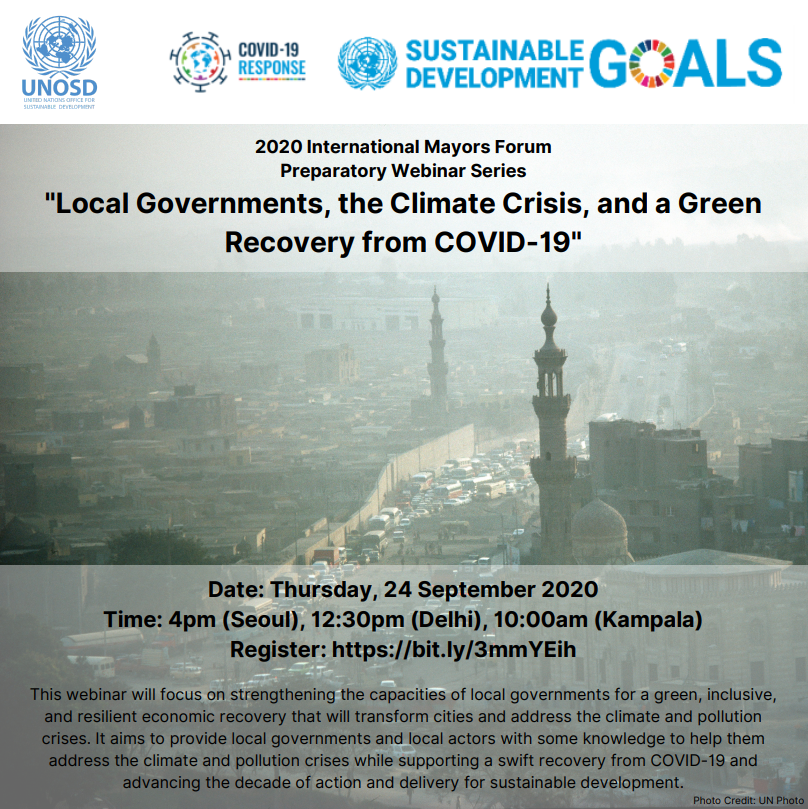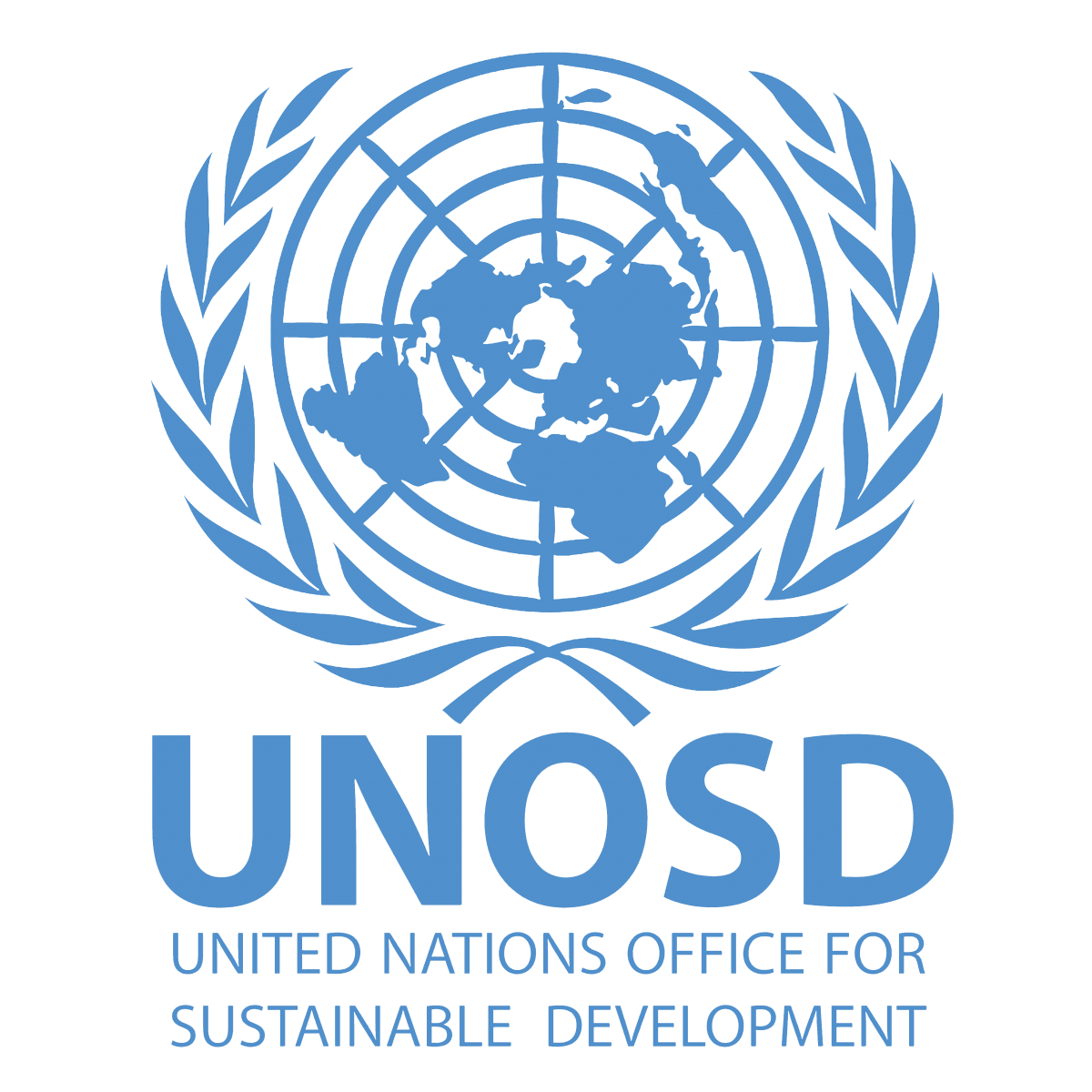[2020 International Mayors Forum Preparatory Webinar Series - Webinar #2] Local Governments, the Climate Crisis, and a Green Recovery from COVID-19

Overview
Local Governments, the Climate Crisis, and a Green Recovery from COVID-19
Recording of the Webinar
International Mayors Forum Preparatory Webinar Series - Webinar #2
Documents and Readings
CONCEPT NOTE (Updated as of 16 September 2020)
SPEAKER BIOGRAPHY (Updated as of 24 September 2020)
PARTICIPANT LIST (updated as of 10 November 2020)
Background
Across the globe, local governments and local actors are on the frontline in preparing for and responding to the devastating impacts of the COVID-19 pandemic as well as multiple challenges from the climate crisis. In the past 20 years, 90% of major disasters have been climate related. Wildfires, hurricanes, typhoons, floods, droughts, and other disasters are linked to the effects of a rapidly changing climate as a result of human planetary impact. These hazards and disasters increase the risks and challenges of advancing on sustainable local development, while stalling progress on the 2030 Agenda. In addition, how local governments respond to the COVID-19 recovery amid the climate crisis is linked to the feasibility of meeting the Paris agreement’s targets of remaining at a global temperature increase of 1.5 °C above pre-industrial levels.
The UN Secretary-General has underscored that local governments are already taking action to recover better from the pandemic, but more must be done to strengthen the capacities of local governments for a "green, inclusive and resilient economic recovery that will transform cities and address the climate and pollution crises". Today, experts point to a temporary reduction in carbon emissions, thanks to lockdowns and reduced economic activities, but in some cases the Pandemic has also led to reduced environmental management. As the pandemic has raged in Brazil, illegal logging in the Amazon has soared with 64% more land cleared in April 2020 than the same month last year, and sadly 2019 was the biggest year for deforestation in more than a decade. These trends will impact the possibility of achieving environmental targets especially under Sustainable Development Goals (SDGs) 13 and 15. Current data also shows that SDG 7 on access to affordable and clean energy, will also see negative impacts. Due to the economic impacts of COVID-19, the world is seeing a reduction of 20% in energy investment (almost US$ 400 billion), the largest decline ever recorded. In addition, as household incomes decline, it can be expected that access to renewable energy options or even basic public electrification expenditures to expand energy access will decline across the developing world, leaving many with basic energy access and opting for subsidised brown energy options. These energy options have knock-on effects on air quality and other environmental and health targets under the 2030 Agenda as well.
As urbanization has increased in many parts of the world, it has often been accompanied by significant environmental challenges. The increasing intensity and frequency of extreme weather and climate impacts globally suggest that urgent efforts are needed to better assess and manage climate risk, especially among local governments, who often have neither the human and financial resources nor the necessary expertise to address adequately those issues. The climate crisis is occurring in tandem with global mega-trends marking the unsustainability of cities in the business as usual. These mega-trends include a growing urban population, declining biodiversity, resource depletion, environmental degradation, the unpredictability of climate-related disasters and more. Local officials can play a central role in ensuring a swift and sustainable recovery from COVID-19 that can address these mega-trends and accelerate progress in delivering the Sustainable Development Goals during the coming decade.
Organizers

This webinar is organized by the United Nations Office for Sustainable Development of the United Nations Department of Economic and Social Affairs
Objectives and Content
In accordance with a policy brief launched by the UN Secretary-General on COVID-19 in an Urban World, this second webinar for the 2020 International Mayors Forum focuses on strengthening the capacities of local governments for a "green, inclusive and resilient economic recovery that will transform cities and address the climate and pollution crises".
It aims to provide local governments and local actors with some knowledge to help them go in that direction, while supporting a swift recovery from COVID-19 and advancing the decade of action and delivery for sustainable development.
Target Audience
This webinar aims to engage sub-national government representatives, local government leaders, and national institutions across the UN Member States. The webinar will also be open to non-government experts working in the areas of national to local SDG implementation. Experts working on all related areas such as climate adaptation and mitigation, nature-based solutions, sustainable cities and similar areas are also invited to join.
The webinar is also open to academia, youth, and other interested stakeholders to ensure an inclusive and integrated discussion on accelerated local solutions for the SDGs and the 2030 Agenda.
Opening/Moderator
- Mr. Jean D’Aragon, Officer in Charge, UN Office for Sustainable Development, UN DESA
Speakers
- Dr. Marco Martuzzi, Head, Asia-Pacific Centre for Environment and Health of the World Health Organization Regional Office for the Western Pacific
- Hon. Mayor Noel E. Rosal, Legazpi City, Philippines
- Dr. Soojeong Myeong, Senior Research Fellow, Korea Environment Institute (KEI)
- Ms. Taeko Yokota, Programme Expert on DRR and the Water, UN Centre for Regional Development (UNCRD)
For more information:
Sara Castro de Hallgren, UNOSD, UN DESA at sara.castrohallgren@un.org
Disclaimer:
For the purpose of this event, UNOSD procures the services of Cisco Webex, an external service provider. Registration for this webinar is supported by the Webex Events registration mechanism and does not imply the expression of any opinion whatsoever on the part of the Secretariat of the United Nations concerning the legal status of any country, territory, city or area or of its authorities

